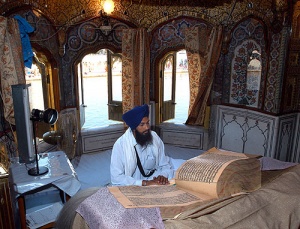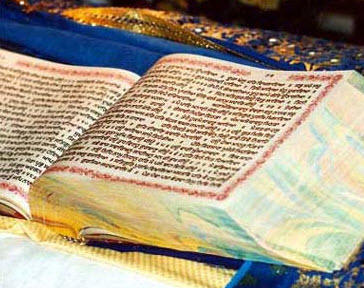Sikh Gurus > Guru Granth Sahib Ji
 Guru Granth Sahib is the supreme spiritual authority and head of Sikh
religion. Sikhs don't worship the Guru Granth Sahib as an idol but
rather emphasis is placed on respect of the book for the writing, which
appears within. Guru Granth Sahib is a collection of devotional hymns
and poetry which proclaims God, lays stress on meditation on the God,
and lays down moral and ethical rules for development of the soul,
spiritual salvation and unity with God.
Guru Granth Sahib is the supreme spiritual authority and head of Sikh
religion. Sikhs don't worship the Guru Granth Sahib as an idol but
rather emphasis is placed on respect of the book for the writing, which
appears within. Guru Granth Sahib is a collection of devotional hymns
and poetry which proclaims God, lays stress on meditation on the God,
and lays down moral and ethical rules for development of the soul,
spiritual salvation and unity with God. This book contains no historical narratives, no biographical details and no obligatory rituals. It is quite simply a collection of spiritually exalted poetry, written by the ten living Sikh Gurus and by Hindu and Muslim saints. The word 'Sikh' in the Punjabi language means 'disciple'. The founder of the Sikh religion was Guru Nanak who was born in 1469. Guru Nanak passed on his enlightened leadership of this new religion to nine successive Gurus. The final living Guru, Guru Gobind Singh died in 1708. During his lifetime Guru Gobind Singh established the Khalsa order. The Khalsa are men and women who have undergone the Sikh baptism ceremony and who strictly follow the Sikh Code of Conduct and Conventions and wear the prescribed physical articles of the faith. Before his death in 1708 Guru Gobind Singh declared that the Sikhs no longer needed a living Guru and appointed his spiritual successor as Sri Guru Granth Sahib. Guru Gobind Singh felt that all the wisdom needed by Sikhs for spiritual guidance in their daily lives could be found in Sri Guru Granth Sahib, the Eternal Guru of the Sikhs.
"AGYA BHAI AKAL KI TABHE CHALAYO PANTH
SABH SIKHAN KO HUKAM HAI GURU MANIYO GRANTH "
Guru Arjan Dev the Fifth Sikh Guru compiled the original version of the Guru Granth Sahib. Guru Arjan Dev started collecting the original verses of all the Gurus. He collected original manuscripts from across the country including from families of the previous Gurus. This original edition of the Guru Granth Sahib known at that time as Pothi Sahib was installed on a high pedestal within the Harmandir Sahib ( Amritsar , Punjab ) in August 1604. Guru Arjan Dev seated himself at a lower level and instructed all Sikhs to bow before it. Guru Gobind Singh, the tenth Guru, compiled a new edition of the Granth Sahib. He included all of the hymns appearing in the original edition as well as the hymns of his late father, the Ninth Master Guru Tegh Bahadur. He also included one of his hymns even though he was a great writer and poet. The great task was finally completed in 1705.
 Guru Granth Sahib has 1430 pages containing 3,384 hymns; it also
includes many couplets. There are 2,218 hymns and couplets written by
Guru Arjan Dev, 974 by Guru Nanak, 907 by Guru Amar Das, 856 hymns and
couplets by Guru Angad, Guru Ram Das, Guru Tegh Bahadur, and 1 couplet
by Guru Gobind Singh the tenth Guru. Guru Granth Sahib is also the only
scripture of it's kind which not only contains the works of it's own
religious founders but also writings of people from other faiths. These
writings are contained due to similarity of their message with Gurus
message.
Guru Granth Sahib has 1430 pages containing 3,384 hymns; it also
includes many couplets. There are 2,218 hymns and couplets written by
Guru Arjan Dev, 974 by Guru Nanak, 907 by Guru Amar Das, 856 hymns and
couplets by Guru Angad, Guru Ram Das, Guru Tegh Bahadur, and 1 couplet
by Guru Gobind Singh the tenth Guru. Guru Granth Sahib is also the only
scripture of it's kind which not only contains the works of it's own
religious founders but also writings of people from other faiths. These
writings are contained due to similarity of their message with Gurus
message. Following are some details on non-Sikh saints whose writings appear in Granth Sahib.
292 hymns by Kabir:
Kabir was born to a Brahmin mother and raised by a muslim step mother.
4 hymns and 130 couplet of Sheikh Farid:
Farid was a sufi saint from Punjab .
60 hymns by Namdev:
Namdev was a celebrated saint from Maharashtra who traveled extensively across the country.
41 hymns by Ravidas:
Ravidas was represented the bhakti movement same as Kabir. He came from a low caste family.
Other authors include:
Trilochan a saint from Vaish caste, Dhanna from Jat family of Rajasthan, Beni , Sheikh Bhikan a muslim sufi scholar, Jaidev, a poet from royal court of king Lakshman Sen of Bengal . Surdas, born in Brahmin family. Parmanand, Pipa, Ramanand, pioneer of Bhakti movement in Northern India . Sadhna a butcher by profession from Sind . Sain a barber from royal court of Raja Ram, king of Rewa.
Guru Granth Sahib also contains few couplets by Baba Mardana, a muslim born and disciple of Guru Nanak who palyed rubab and accompanied Guru Nanak.
Guru Granth Sahib also contains Swayyas (praises offered to Gurus) of Bhattas. Bhattas were a group of musicians who lived in sixteenth century. All of them were scholars, poets and singers.
